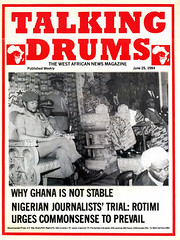Comment
A More Confident Rawlings
For a long time the PNDC government has cited security reasons and the threat of an invasion by Ghanaians living outside the country as the reason for keeping on the curfew. The way the curfew has operated in the country, however, has shown that apart from the first few weeks after 31 December, 1981 when the Provisional National Defence Council were trying to consolidate their power, the curfew has been used by the ruling group, their friends and sympathizers as a punitive weapon against the people of Ghana. While everybody else had to be in their homes by 6.30pm or 8.30pm or 10pm or midnight, depending on what the current whim of the PNDC was, the 'curfew pass' became the new status symbol in the country.
In the event, not many people resented very much the fact that the PNDC members and their friends wanted the entire country as their playground in the night while everybody else was confined to their homes, it was the very sinister things that began to occur regularly during the curfew hours that caused the most unease.
While the attempted coups - real or imaginary occurred with unnerving regularity and not only under the cloak of the night and showed that the curfew was not in place for any security reasons, the curfew hours were used to perpetrate a reign of terror in which the regime was either clearly implicated or at least turned a blind eye to.
The abductions and murders that took place in 1982 all occurred under the protection of the curfew. The rise of armed robbery in the country has occurred under the curfew with no satisfactory explanation ever being given about how the people came to be at so much risk during the hours when only a select and trusted few were supposed to be roaming the land and the rest were deemed unworthy of the privilege.
In the convoluted logic of Fit-Lt Rawlings' people's government, the majority of the people were condemned to the tyranny of a curfew which in 1982 was enforced with a crudity far beyond anything seen in Ghana before as people were beaten up by soldiers and policemen and some others had to pay heavy fines for TALKING in their own homes during curfew hours.
The curfew was used as punishment for those who opposed the PNDC which increasingly, in the regime's mind, had come to mean all who have not proclaimed themselves revolutionary cadres, and as a prize reward for the supporters of the PNDC. Thus on 4 June, the curfew was lifted to enable the revolutionaries to celebrate, and 6 March, which is the country's independence day, was not deemed important enough for the people to be given a respite.
The PNDC probably now have started to think that freedom is theirs to give and the lifting of the curfew is a big favour they have bestowed on a country that should jump up in ecstasy to thank them.
In much the same way, they have come to believe that closing and opening the country's borders should also depend on what mood the Leader of the Revolution finds himself in on any particular day.
It is now obvious that even the PNDC have abandoned the pretence that the repressive security measures that have been in place in the country these past two and a half years are aimed at protecting "the people's interests". Flt-Lt. Rawlings has learnt the art of survival for himself and does not care very much how many people are destroyed in the process, or how much inconvenience is caused to his compatriots.
Thus, if he now feels confident enough to be able to open a few more crossing points on the country's borders, his captive subjects are undoubtedly most grateful for the generosity and for the added bonus of allowing them to go to bed at a time of their own choosing.
It has been suggested, of course, that the "opening" of the borders, like the lifting of the curfew have become possible because of pressure from potential donor countries and international organisations who have urged the Flight-Lieutenant to take such measures as conditions for giving him the aid and loans he so desperately needs.
Again, if that is the moving power behind the decision, the people of Ghana are all the same still grateful that they have been considered qualified to enjoy a measure of the freedom that other people take for granted.
A few months before the curfew was lifted, the PNDC were not being picked up during curfew hours which is the ploy that has been used by many armed robbers to gain access into their victims' homes. It was most educative that it took the regime almost two years after the abduction and murder of High Court judges to be able to state that people were NOT being ordered to be picked up at night.
Those who lost their lives and possessions during the 30 months of enforced nightly imprisonment cannot, of course, now be recompensed in any way. For the greater majority of people, it will take some time to get used to a mode of life they had taken for granted for a long time.
There is in one of Ghana's jails currently Mr Obeng Manu who brought the wrath of the regime on himself by stating publicly that Ghanaians had become chicken in one huge poultry farm who are sent to bed when it pleases Flt-Lt. Rawlings and are let out again at his pleasure. Now that people may go to bed at a time of their own choosing, maybe he will now be seen as posing no threat and released from custody
